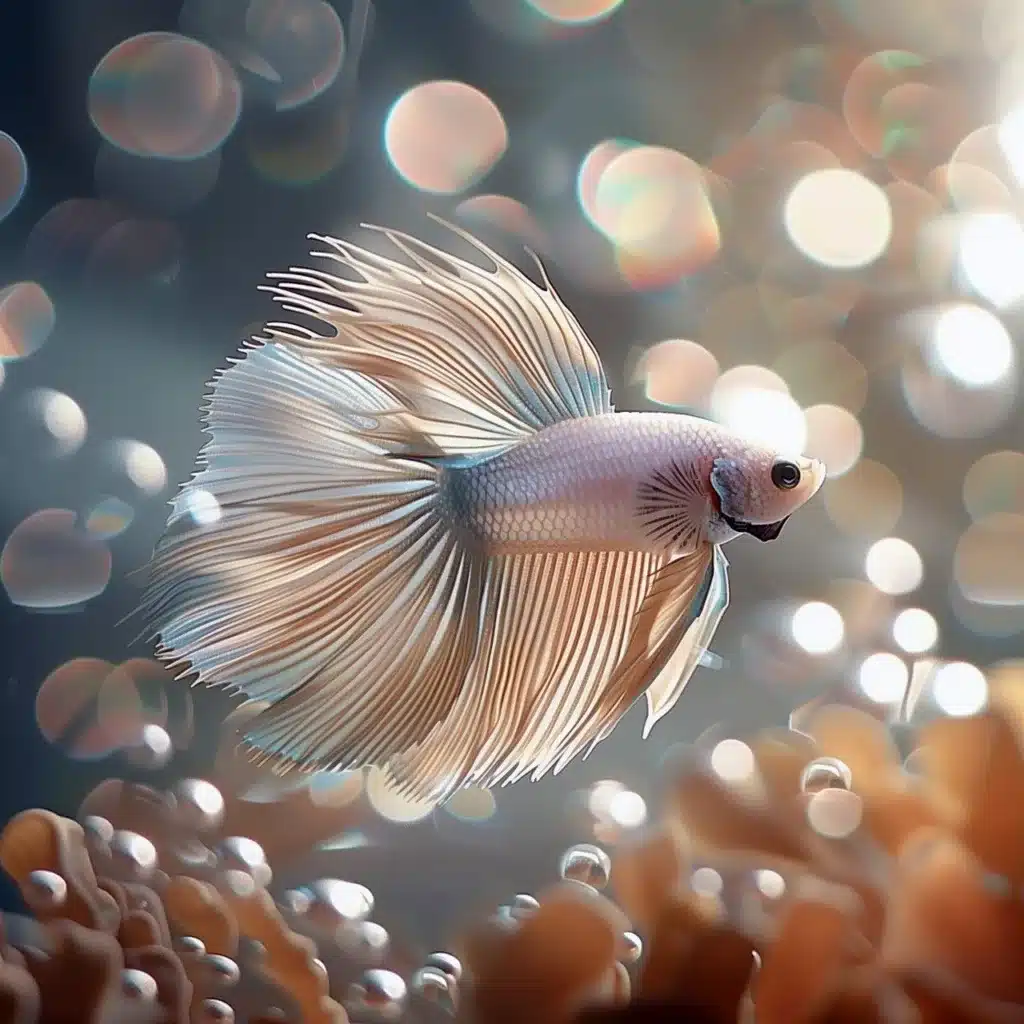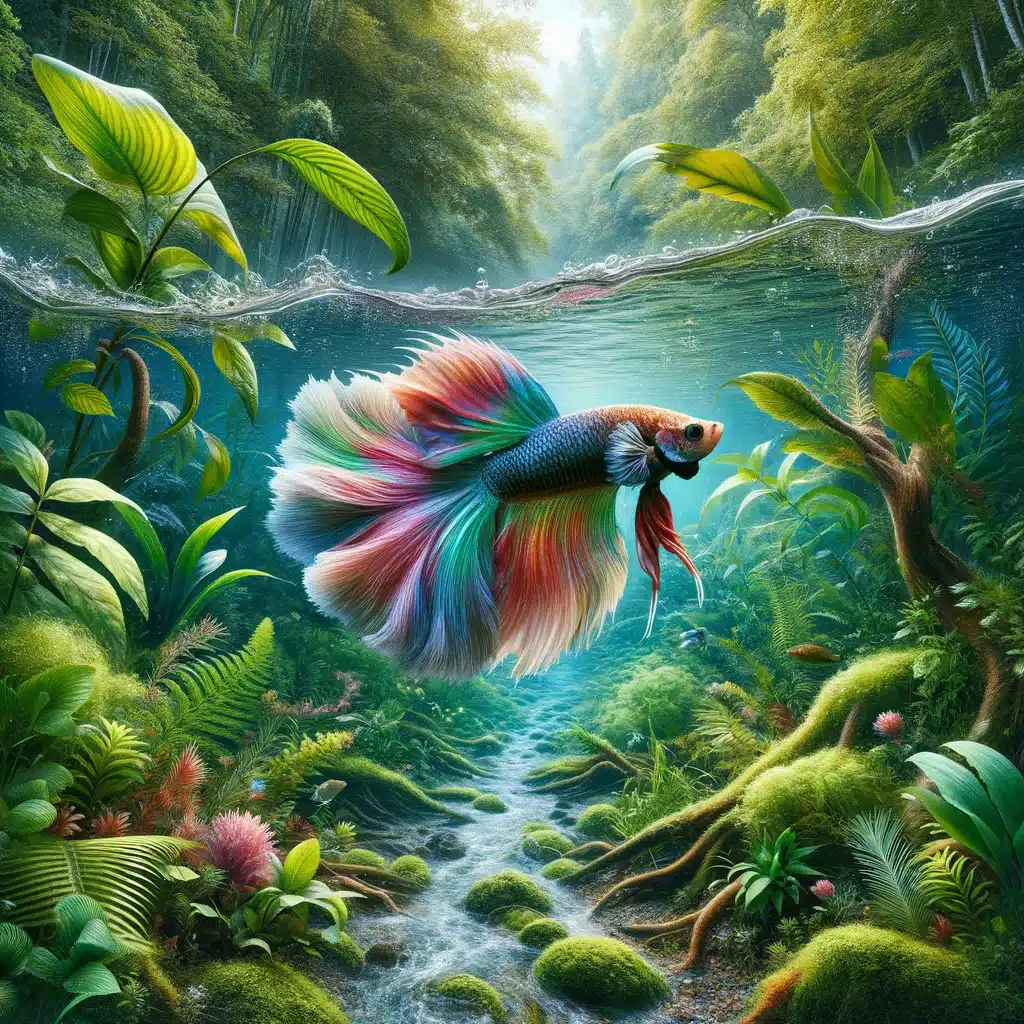Hey there, fellow fish enthusiasts! Have you wondered, “What do betta fish eat in the wild?” Well, you’re in luck because that’s exactly what we’re diving into today. In the wild, betta fish feast on a diet of insects and insect larvae alongside the occasional small crustaceans. It’s a fascinating world for these vibrant creatures, far different from the life they lead in our home aquariums. So, buckle up as we explore the natural dining habits of betta fish and how they contrast with their captive counterparts. Plus, we’ll learn how the hunt for their next meal shapes their behavior in the wild. Ready to get started? Let’s jump right in!
What Do Betta Fish Eat In The Wild?
Let’s explore the natural diet of betta fish in their wild habitat. What betta fish eat in the wild is a real adventure. Imagine tiny, vibrant warriors navigating dense aquatic jungles, constantly on the lookout for their next meal. It’s a world away from the neatly portioned pellets they often receive in captivity.
In their natural environments, these fish are hunters at heart. They use their keen senses to spot potential meals, which mainly include a variety of insects like mosquito larvae, water beetles, and other small critters that find themselves unlucky enough to skim the water’s surface. But it’s not just insects on the menu; betta fish are also known to snack on tiny crustaceans and even smaller fish if the opportunity arises.
This diet is rich in protein and important nutrients, crucial for maintaining their health, brilliant colors, and energy levels. It’s a testament to their adaptability and predatory skills. The variety and hunt for live prey fulfill their nutritional needs and keep their instincts sharp and behaviors natural.
Understanding this aspect of betta fish life illuminates the remarkable differences between their existence in the wild and our homes. It also highlights the importance of replicating this variety in their diet when we keep them as pets to ensure they lead fulfilling and healthy lives. So, let’s keep this wild diet in mind as we care for these fascinating creatures in our aquariums.

Differences Between Wild and Captive Betta Fish Diets
As we’ve discovered, betta fish are naturally hunters in the wild. Their diet is an array of live prey, including insects, larvae, and small aquatic animals. This diet is not just about filling their bellies; it’s about the hunt, the chase, and the satisfaction of catching their food. It’s dynamic, it’s varied, and it’s crucial for their overall health and growth.
Now, compare this to the typical diet of a betta fish in captivity. Many betta owners rely on commercial pellets or flakes, which are convenient and formulated to meet their nutritional needs. While these foods are designed to provide a balanced diet, they lack the variety and excitement of live prey. Plus, feeding on live foods allows bettas to engage in their natural predatory behaviors, benefiting their mental and physical health.
Another point to look at is the food’s nutrition. Wild diets are high in protein and essential fats, which are crucial for betta health, particularly for their vibrant colors and fin health. While many high-quality commercial foods do a great job mimicking this nutritional profile, there’s something to be said about a wild diet’s natural variety and quality.
It’s also worth noting that the frequency and quantity of feedings differ. In their natural habitat, bettas might eat smaller amounts more frequently, depending on prey availability. In contrast, bettas in captivity often have a more regular feeding schedule. It’s essential for betta owners to avoid overfeeding and to try to mimic natural eating patterns as closely as possible.
Understanding these differences highlights the importance of providing a varied and nutritionally complete diet for captive bettas. Incorporating frozen or live foods, like bloodworms or brine shrimp, into their diet can help bridge the gap between captive care and their wild counterparts’ natural eating habits. Not only does it cater to their nutritional needs, but it also offers mental stimulation and keeps their predatory skills sharp.
So, while our captive bettas might not need to hunt for their supper, we can ensure their diet is as close to nature’s intended. This benefits their health and enriches their lives in our care.
How Does The Availability Of Food Affect Betta Fish Behavior
In the wild, food availability can fluctuate dramatically, influencing the health of betta fish and their behavior and social interactions. When food is plentiful, betta fish may display less aggressive behavior as the need to compete for resources diminishes. This abundance allows them to focus more on growth, reproduction, and exploring their environment.
However, during periods of scarcity, the situation changes drastically. Betta fish are known for their territorial nature, and when food becomes scarce, this trait is amplified. They become more aggressive towards others encroaching on their territory as each betta seeks to secure enough resources to survive. This aggressive behavior ensures their first dibs on available food, maintaining their strength and health.
Food scarcity also encourages betta fish to become more opportunistic and adaptable in their feeding habits. They might explore new areas or adapt to eating different types of food than they usually would. This adaptability is crucial for survival in the wild, showcasing their ability to adjust to changing conditions.
Furthermore, the struggle for food in lean times can lead to more sophisticated hunting techniques and strategies. Betta fish might become more cunning, patient, or daring in securing a meal, enhancing their natural predatory skills.
Interestingly, the food availability in the wild can also affect mating behaviors. Males may become more aggressive in displaying and defending their bubble nests, aiming to attract females and secure the future generation, especially when they perceive that resources are sufficient to support offspring.
In summary, food availability significantly shapes betta fish’s behavior in the wild, affecting their aggression levels and reproductive strategies. It underscores the importance of understanding these natural behaviors and conditions when keeping betta fish captive. It ensures we provide environments and diets that cater to their innate needs and behaviors.
Conclusion
Let’s summarize what we’ve learned about betta fish and their diets. Betta fish in the wild have a diet full of insects and small critters. This diet helps them stay healthy and active. When we keep betta fish as pets, it’s essential to try to feed them similar foods, like live or frozen snacks, to keep them happy and healthy.
We also found that betta fish can be more aggressive when hungry or when food is hard to find. This shows us why they sometimes act tough in our tanks. It’s all about ensuring they have enough to eat, just like in the wild.
So, taking care of betta fish means giving them the right kinds of food and making their home as close to their natural habitat as possible. This way, we can ensure our colorful fish friends live their best lives. Happy betta fish are all about eating well and feeling at home!
